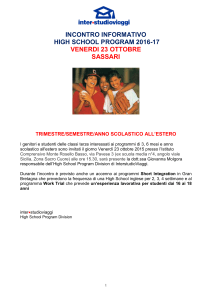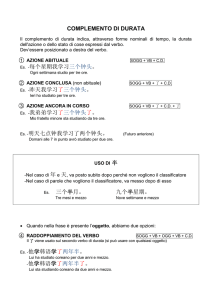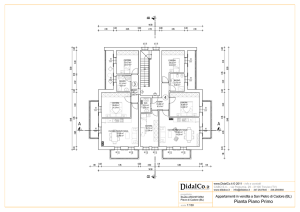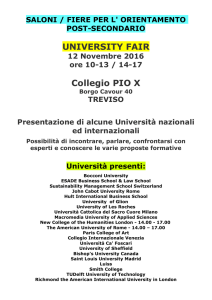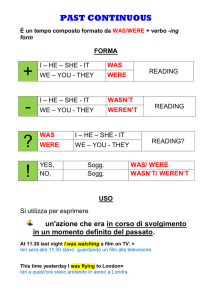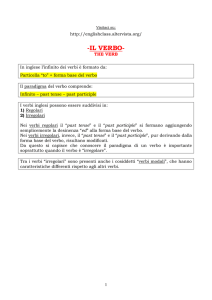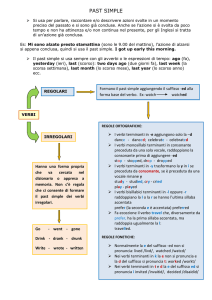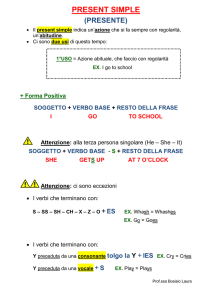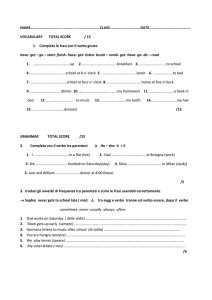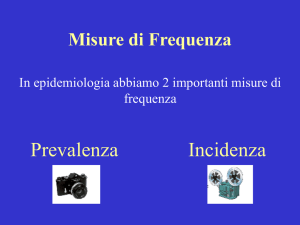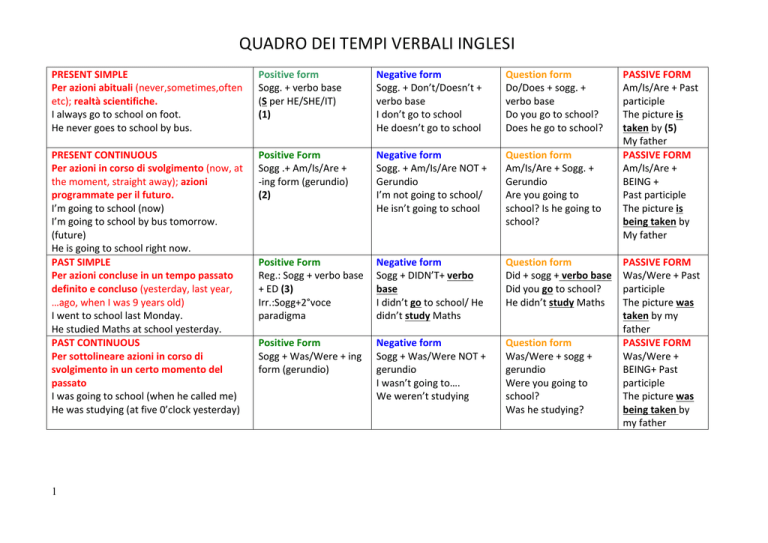
QUADRO DEI TEMPI VERBALI INGLESI PRESENT SIMPLE Per azioni abituali (never,sometimes,often etc); realtà scientifiche. I always go to school on foot. He never goes to school by bus. Positive form Sogg. + verbo base (S per HE/SHE/IT) (1) Negative form Sogg. + Don’t/Doesn’t + verbo base I don’t go to school He doesn’t go to school Question form Do/Does + sogg. + verbo base Do you go to school? Does he go to school? PRESENT CONTINUOUS Per azioni in corso di svolgimento (now, at the moment, straight away); azioni programmate per il futuro. I’m going to school (now) I’m going to school by bus tomorrow. (future) He is going to school right now. PAST SIMPLE Per azioni concluse in un tempo passato definito e concluso (yesterday, last year, …ago, when I was 9 years old) I went to school last Monday. He studied Maths at school yesterday. PAST CONTINUOUS Per sottolineare azioni in corso di svolgimento in un certo momento del passato I was going to school (when he called me) He was studying (at five 0’clock yesterday) Positive Form Sogg .+ Am/Is/Are + -­‐ing form (gerundio) (2) Negative form Sogg. + Am/Is/Are NOT + Gerundio I’m not going to school/ He isn’t going to school Question form Am/Is/Are + Sogg. + Gerundio Are you going to school? Is he going to school? Positive Form Reg.: Sogg + verbo base + ED (3) Irr.:Sogg+2°voce paradigma Negative form Sogg + DIDN’T+ verbo base I didn’t go to school/ He didn’t study Maths Question form Did + sogg + verbo base Did you go to school? He didn’t study Maths Positive Form Sogg + Was/Were + ing form (gerundio) Negative form Sogg + Was/Were NOT + gerundio I wasn’t going to…. We weren’t studying Question form Was/Were + sogg + gerundio Were you going to school? Was he studying? 1
PASSIVE FORM Am/Is/Are + Past participle The picture is taken by (5) My father PASSIVE FORM Am/Is/Are + BEING + Past participle The picture is being taken by My father PASSIVE FORM Was/Were + Past participle The picture was taken by my father PASSIVE FORM Was/Were + BEING+ Past participle The picture was being taken by my father QUADRO DEI TEMPI VERBALI INGLESI PRESENT PERFECT Per azioni concluse in un tempo non ancora finito (today, this year, this week), tempo non specificato. Con: just-­‐yet-­‐
already-­‐still-­‐ever/never. Con: since – for. I have already gone to school PAST PERFECT Per azioni già concluse nel passato prima di altre azioni. I had already gone to school when he called me FUTURE – WILL Per esprimere desiderio, previsione, per azioni non programmate nel futuro. Dopo i verbi: Hope, Think, Guess etc. I will go to Paris / He’ll go to Paris PRESENT CONDITIONAL I would go to school IF I WERE young (4) PAST CONDITIONAL I would have gone to school 2
Positive Form Sogg+Have/Has+past participle Negative form Sogg+Have/Has+NOT+ Past participle I haven’t gone to school yet. Question form Have/Has+ sogg+ past participle Have you gone to school? PASSIVE FORM HAVE/HAS BEEN+ past participle The picture has been taken by my father Positive Form Sogg+Had+past participle Negative form Sogg+HAD+NOT+ Past participle I hadn’t gone to school yet Question form had+ sogg+ past participle Had you gone to school? Question form Will+sogg+verbo base Will you go to school? PASSIVE FORM HAD BEEN+ past participle The picture had been taken by my father PASSIVE FORM Will+BE+past participle The picture will be taken by my father PASSIVE FORM Would BE + past participle The picture would be taken by my father PASSIVE FORM Would have+ BEEN+past part. The pict. would have been taken Positive Form Sogg+will (‘ll)+verbo base Negative form Sogg+will not (won’t)+verbo base I won’t go to school He won’t go to school Positive Form Negative form Sogg+would (‘d) +verbo Sogg+would NOT base (wouldn’t) + verbo base I wouldn’d go to school Positive Form Sogg+would have+past participle Negative form Sogg+wouldn’t have+ past participle I wouldn’t have gone to school Question form Would+sogg+verbo base Would you go to school? Question form Would +sogg+ have+past part. Would you have gone to school? QUADRO DEI TEMPI VERBALI INGLESI NOTE 3
(1) VARIAZIONI ORTOGRAFICHE Alcuni verbi subiscono delle variazioni prima di prendere la S alla terza persona singolare (HE/SHE/IT). Prendono una E i verbi terminanti in: -­‐CH To Watch He watches -­‐SH To Flash It flashes -­‐O To Go She goes -­‐Z To Buzz It buzzes -­‐S To Pass He passes -­‐X To Mix It mixes I verbi terminanti in Y preceduta da CONSONANTE cambiano la Y in IE prima di aggiungere la desinenza S alla terza persona singolare: TO STUDY = He studies ATTENZIONE: se prima della Y c’è una vocale non si cambia niente es.: TO PLAY = He plays (2) VARIAZIONI ORTOGRAFICHE DEL GERUNDIO I verbi terminanti con il dittongo IE cambiano IE in Y prima di aggiungere il suffisso ING Es.: TO DIE = DYING I verbi terminanti con una sola consonante preceduta con una sola vocale, RADDOPPIANO la consonante finale SE: a) Sono MONOSILLABI TO STOP = STOPPING b) Sono PLURISILLABI con accento sull’ULTIMA SILLABA TO TRAVEL = TRAVELLING TO PREFER = PREFERRED (3) VARIAZIONI ORTOGRAFICHE DEL SIMPLE PAST I verbi terminanti con una sola consonante preceduta con una sola vocale, RADDOPPIANO la consonante finale: ES.: TO STOP = STOPPED I verbi terminanti in Y preceduta da CONSONANTE cambiano la Y in I prima di aggiungere la desinenza ED Es.: TO STUDY = I STUDIED QUADRO DEI TEMPI VERBALI INGLESI 4
I verbi terminanti in E muta perdono la E prima di aggiungere la desinenza ED Es.: TO LIKE = I LIKED (4) VERBO ESSERE DOPO IL CONDIZIONALE In inglese il modo congiuntivo NON esiste, ma si usa il SIMPLE PRESENT o il SIMPLE PAST secondo il bisogno. Il verbo BE è l’unico ad avere una forma congiuntiva al passato: IF I WERE IF YOU WERE IF HE WERE IF SHE WERE IF IT WERE IF WE WERE IF YOU WERE IF THEY WERE (5) PASSIVE FORM La forma passiva in inglese si fa coniugando il verbo BE al tempo verbale desiderato. Il complemento d’agente (colui che compie l’azione nella forma passiva) è introdotto dalla preposizione BY.

